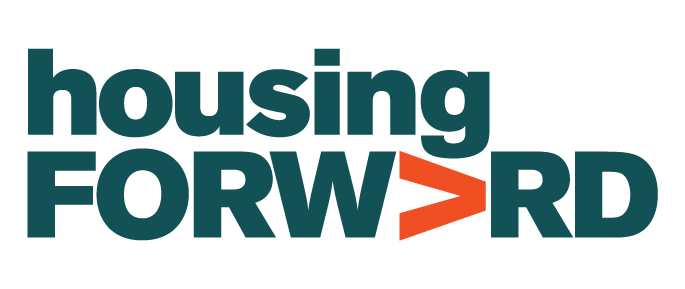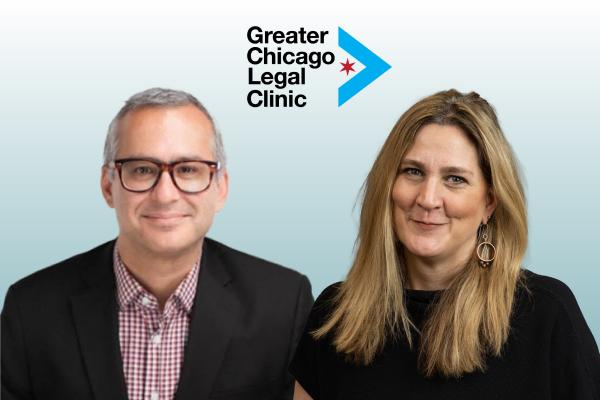The State of Homelessness Panel Recap
On Tuesday, May 20 we hosted our first community series event, The State of Homelessness: Exploring a Shifting Policy Landscape at the Berwyn Public Library. The panel, hosted by our very own Lynda Schueler, included Foluke Akanni, Gillian Night, and Katie Eighan. Thank you to Berwyn Alderman Rob Pabon for sponsoring the event and the Berwyn Public Library for hosting. Read on for highlights from the conversation and some the background on our panelists.
Trends in Homelessness
Foluke: “Statewide we’re seeing an increase in rents.... When we talk to our state partners and folks who are doing the work, we are also seeing a lack of affordable housing statewide.... In Illinois we lack more than 240,000 units of housing for extremely low-income individuals.”
Katie: “Across all the suburbs [in 2023], about 12,000 individuals touched the homeless response system at some point. When we look at 2024, there were about 14,200. If we go back to 2020, that was more 8,000 or 9,000. Part of that is the increased capacity of providers to provide homeless intervention services, but a huge piece of that is increased demand of people who can't afford their rent and so they are facing housing insecurity.”
Gillian: “In the suburbs specifically, [from 2018 to 2024] the healthy got healthier and for communities that had less access, things have gotten a little worse... the reality is that socioeconomic status is correlated with your health outcomes.”
Federal Impacts
Gillian: “I would make the argument that private philanthropy is no match for the full force of the federal government. In conversation with a lot of our partners and the current environment that they’re in, they’re really on a spectrum of how scared they are. Not to be glib about it, but we have an organization that was put on a terrorist list. They have very different concerns from other organizations... What we’re seeing now is not a crisis that started yesterday – it's 50 plus years in the making. And so, we’re really pushing for the narrative to change, we need to take a longer view.”
Katie: “The Continuum of Care program is really the federal backbone to the homelessness response system. It’s the primary source of funding for [permanent supportive housing] which is serving folks who have been homeless the longest and who have chronic disabling conditions. It’s also the primary funding source for rapid rehousing... There are 19 Continuum of Cares agencies in Illinois. This infrastructure that gives local [CoC agencies] the power to allocate federal dollars to best meet the needs of their communities .... In suburban Cook County it’s $27 million dollars to 45 different housing programs, about 1,100 households in PSH, RRH, TH. That’s just shy of a $1 million in rent every month.”
Foluke: “President Trump proposed a ‘skinny budget,’ basically cutting HUD programs by 43%. In that proposed plan, it also merges five rental assistance programs that HUD manages... It would eliminate CDBG funds which are block grants that help with community development in counties and cities. It’s also eliminating home investments that help low to moderate income households pay for mortgages and help them to get home ownership...” “Republicans have until September 30 to pass that budget. There's still going to be a lot of advocacy and communication going on...”
Katie on the removal of the Housing First model being removed from HUD and other federal housing resources: “What the Housing First philosophy states is that people need housing first in order to be able to address any other barriers they may be facing. It means that someone doesn’t need to be sober, to have a job, to be taking their meds to access crisis housing. Because if you’re staying outside and you don’t have a safe and stable place to go every night, it’s going to be impossible for you to meet those other needs and accomplish your other goals that you have for yourself. It is a philosophy that many community-based partners have operated under for decades... just because it’s been taken off the HUD website, doesn’t mean we will not continue to operate with a housing first approach in suburban Cook County. Our network of partners know that this is how we address homelessness.”
State Level
Foluke “We have about 25 municipalities that have passed camping ban ordinances, basically saying that folks who are unsheltered or using life sustaining activities, sleeping or drinking non-alcoholic beverages, can be fined, arrested, put to jail because they are basically homeless...” Click here to learn more about HB 1429 that would prevent this ban in Illinois.
Main Takeaways
- Sign up for advocacy alerts
- Contact your Representatives and let them know your thoughts on the skinny budget and potential cuts to HUD
- Go to your local city Council meetings, particularly when they are discussing developing affordable housing or other policies that affect income and cost of living
Foluke Akanni
Foluke joined Housing Action Illinois as Housing Policy Organizer in August 2020. In her time at Housing Action Illinois, she was part of the Illinois Coalition for Fair Housing that helped pass a statewide Source of Income protection bill, she also organizes Housing Action Illinois 190+ members across the state to take action around public policy issues that affect homelessness and affordable housing in Illinois.
She has over a decade of diverse experience working in community outreach and relationship building in the nonprofit sector. She previously worked at the Citizens Utility Board in the outreach department, educating communities on energy efficiency and utility policies in Illinois. Her experience includes working at a refugee resettlement agency, where she helped refugees find employment, and in student affairs, helping students in their career and professional development. She started her nonprofit career as an AmeriCorps VISTA working for an organization whose mission included stopping gentrification in a North Minneapolis neighborhood.
Foluke earned her B.A. from the University of Minnesota and completed her M.Ed. in Education Leadership and Policy from Marquette University. She is pleased that she gets to advocate for vulnerable populations across the state.
Gillian Knight
Gillian is the Program Manager of Learning and Evaluation at Healthy Communities Foundation. In her role, Gillian puts to work her belief that learning and evaluation are essential to transforming society by helping establish the Foundation’s evaluation framework. This process, informed by the Foundation’s strategic plan and leaders in the region, will chart its progress towards equity.
After obtaining her Bachelor of Arts in Politics and Psychology from Lake Forest College, she spent a decade working with Chicago’s young people in food sovereignty, housing, and health. She received a master's degree in social work and a master's degree in public health from the University of Illinois at Chicago. Originally from the Southwest and current Bridgeport resident, she is a constantly disappointed Suns fan, a Chicago Sky and WNBA supporter, and avid flower gardener.
Katie Eighan
Katie is the Continuum of Care Planning Director at the Alliance to End Homelessness in Suburban Cook County, the lead agency for the Cook County Continuum of Care (IL-511). Katie joined the Alliance in 2018 and has led several initiatives related to developing, implementing, and funding solutions to end and prevent homelessness in the suburbs of Chicago.
Initiatives include strategic planning and resource coordination, Youth Homelessness Demonstration Program, HUD CoC Funding Competition, local/state/federal legislative and budget advocacy, and facilitating community-led decision-making to remove barriers to housing for people experiencing homelessness.
Katie received her B.A. in Environmental Studies and Political Science from the College of St. Benedict in central Minnesota and received her M.S. in Political Science and Community and Economic Development from Illinois State University.
For Media Inquiries Contact
Libby Foster
lfoster@housingforward.org
708.338.1724 ext 211







